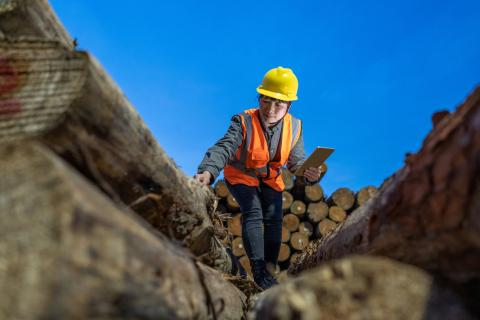EU to crack down on illegal timber trade by 2012
It is now clear that an EU-wide ban on placing illegal timber products on the EU market will come into effect in 2012.
In a landmark voting on the 7th of July, the European Parliament approved a proposal to ban illegal timber trade in EU. Although the EU member states formally need to endorse the legislation also, this is considered a formality.
Focus on “first placers”
The regulation focuses strongly on those operators who place wood products on the EU market for the first time, including importers and European forest operations. It explicitly prohibits placing illegal timber on the EU market, which means that ‘first placers’ are liable under the law.
First placers are also required to set up and follow a Due Diligence system to avoid trading in illegal wood products. Traders further down the chain are only required to keep records of their immediate suppliers and buyers. Penalties for infringements will be determined by each member state.
A central part of the due diligence requirements applicable to 'first placers' is to include a risk assessment procedure determining the risk of sourcing wood products from specific buyers or locations. In case of identified risk, the company is obliged to carry out further actions to minimize the risk.
Boost for verified and certified wood
How do certified and legally verified wood products fit into the picture? “It is clear that companies which have enrolled in credible forest certification or timber legality verification schemes will have a better basis for ensuring compliance with the Due Diligence requirements”, says Christian Sloth,
Manager of the Rainforest Alliance’s legality verification program.
The regulation mentions certification and other third-party verification schemes as one of the means to minimize risk of illegality. It also states that “...any voluntary chain of custody mechanism which fulfils the requirements under this Regulation may be used as a basis for the due diligence system”.
Timber products with a FLEGT or CITES license are also considered legally harvested under the regulation and need no further risk assessment.
Preparing for Due Diligence is important
Christian Sloth explains: “Complying with the Due Diligence regulation will be of paramount importance for companies importing wood products into the EU, and those who are unprepared by 2012 may run into major problems".
"Companies must learn to ask the right questions from their buyers and to assess their risk properly. The Rainforest Alliance and its European partner NEPCon will provide the full range of services needed for companies to meet the EU requirements for Due Diligence, including training of company staff, risk assessments, Due Diligence systems and tools as well as verification of the legality of timber and wood products”.
Sloth adds: “Together with FSC, we are also developing a free online tool for assessing the risk of buying illegal or otherwise unacceptable timber from various locations, www.globalforestrisk.org".
Will Due Diligence help to halt illegal logging?
According to recent reports, we are now starting to see the impact of the US Lacey Act which prohibits trade in illegal wood products in the US. Is the EU approach likely to have the same level of effect?
“It is very encouraging that the EU is adopting an outright ban on first-time placing of illegal timber on the EU market”, says Sloth. “Compared to the Lacey Act, the additional requirement for due diligence systems is a clear strength of the EU approach. On the other hand, the Lacey Act holds all market operators liable for trading illegal wood, while the EU system focuses on the first link in the supply chain inside the EU, thereby leaving some loopholes open. We may expect to see a host of temporary brokers emerging on the scene, facilitating the entry of illegal wood products into the EU. Law enforcement authorities will have to take this scenario into account”. '
The EU market – a global factor in deforestation
Is it really necessary for EU importers to set up all these systems? Yes, according to Sloth:
“EU is a global key consumer market, and demands from careless buyers play a major role in illegal logging and related problems such as deforestation, climate change, poverty issues and species decline particularly in tropical countries. According to some estimates, illegal wood may account for as much as 20% of wood imports to the EU".
He adds: "Those EU traders who choose fair play and take proper actions to ensure the legality of their wood products should get rewarded rather than having to put up with this type of unfair competition. Even with its shortcomings, the due diligence regulation is a significant step in the right direction”.



